The National Vocational and Technical Training Commission (NAVTTC) was established in 2005 and serves as the central regulatory and management authority for Pakistan’s Technical and Vocational Education and Training (TVET) sector under the Ministry of Federal Education and Professional Training. Their vision is clear: “Skills for Employability, Skills for All.” To achieve this, NAVTTC fulfills a multifaceted mission, they provide strategic direction and support to both public and private institutions, fostering an environment conducive to effective skills development training. This, in turn, aims to elevate both the social and economic standing of Pakistan. NAVTTC’s extensive range of functions ensures a comprehensive approach to TVET reform. From formulating national policies and qualifications frameworks to designing and implementing targeted skill programs, they bridge the crucial gap between industry demand and available skilled labour. NAVTTC also plays a vital role in quality assurance by introducing and conducting accreditation and certification processes. They actively develop skill standards and curricula, ensuring programs remain relevant to evolving industry needs.
Recognizing the importance of collaboration, NAVTTC fosters public-private partnerships and actively engages with industries to strengthen the entire TVET ecosystem. Through a collaborative approach, NAVTTC developed a National Skills Strategy (NSS) with input from industry leaders, educators, policymakers, and international partners. This comprehensive plan serves as a blueprint for modernizing the TVET system. Following the NSS recommendations, NAVTTC has implemented a series of initiatives to improve quality and relevance. These include the National Vocational Qualification Framework (NVQF), a national teacher qualification system, a code of conduct for institutions, an accreditation system, an HR development policy specifically for TVET, and the creation of skill standards and curricula in critical areas.
The impact of these efforts extends beyond individual advancement. Its work has significantly contributed to Pakistan’s national human resource development by generating a large pool of skilled youth who are prepared for both domestic and international employment opportunities. This not only empowers individuals but also strengthens the national economy. Furthermore, the organization prioritizes addressing the needs of underserved regions and marginalized populations, ensuring that the benefits of a robust TVET sector reach all corners of the country.
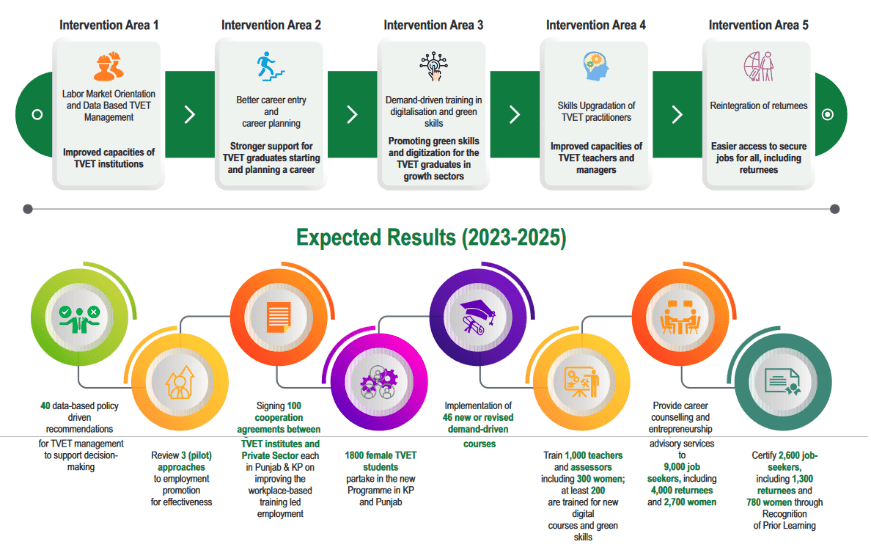
Current Projects
NAVTTC operates through a multi-faceted approach that includes developing policies, designing curricula, accrediting institutions, certifying skills, and establishing industry linkages. It collaborates with various stakeholders, including federal and provincial governments, educational institutions, industry representatives, and international organizations to ensure that TVET programs are relevant and of high quality.
Capacity Building Programs
NAVTTC runs several capacity-building programs aimed at equipping individuals with the skills needed for employment and entrepreneurship. These programs include:
The Prime Minister’s Youth Skill Development Program (PMYSDP) aims to enhance the quality of the TVET sector. Its objective is to equip young people with market-oriented conventional and high-tech skills essential for career advancement, aligning their capabilities with international standards. It is a transformative initiative designed to empower the youth and unlock their potential for human development, shaping the future of Pakistan. The program includes various components to overhaul the entire TVET system in the country. PMYSDP spearheaded by NAVTTC comprises several key components aimed at enhancing the skills and employability of Pakistani youth. The program emphasizes skill development in high-end technologies, equipping young individuals with advanced technical capabilities. It also focuses on traditional trades, providing skill development opportunities for youth from less developed areas, ensuring they gain valuable and marketable skills. Apprenticeship training is a significant aspect of PMYSDP, with over 1,500 youth trained in various leading industries, offering hands-on experience and industry exposure. To ensure the quality and credibility of training, the program includes the nationwide accreditation of TVET institutes, as well as securing international accreditation and establishing joint international degree programs. A critical feature of PMYSDP is the National Employment Exchange Tool (NEXT), which includes a national job portal and career counselling centers, facilitating job placement and career guidance.
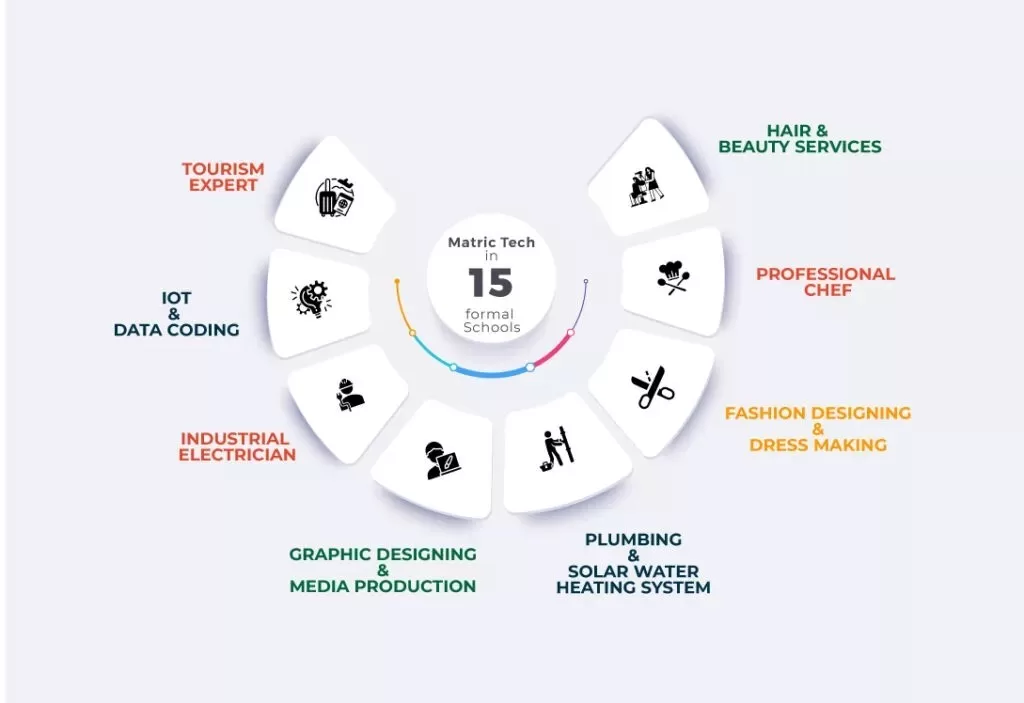
The program also acknowledges informally acquired skills through the Recognition of Prior Learning (RPL), providing certification for such competencies. To support the program’s initiatives, ten destination-specific facilitation centers are being established in cities across Pakistan. The development and standardization of TVET qualifications ensure consistency and quality in vocational training. Additionally, Smart Tech labs are being set up nationwide to support distance learning in TVET. The program also aims to integrate skill development activities in Madrassas by establishing new labs and workshops. A National Accreditation Council is being established in Islamabad to oversee and ensure the quality of TVET education. PMYSDP also includes training TVET teachers according to international practices and ensuring that educators are well-equipped to deliver high-quality vocational training.
TVET Sector Support Program
In Pakistan, approximately two million young people enter the job market each year, often without formal training. The current TVET system, with its 3,740 institutes offering 433,237 places as of 2018, falls short in both quantity and quality, failing to meet job market demands. To address these issues, the Government of Pakistan launched a comprehensive TVET reform in 2011, supported by the European Union and the governments of Germany, the Netherlands, and Norway.
The first phase of the reform, based on the NSS and concluding in December 2016, achieved significant milestones, including the establishment of a national TVET policy, the NVQF, and the introduction of Competency-Based Training & Assessment (CBT&A). The second phase, completed in 2022, focused on improving governance and increasing private sector involvement, targeting Pakistani youth, and returning migrants to enhance skill development aligned with labour market needs. Currently, the third phase, supported by the Federal Republic of Germany, emphasizes the “Skills for All Strategy” with goals focused on green skills, digitization, and gender inclusion.
This phase aims to ensure that at least 3,600 of 6,000 beneficiaries find employment, including 1,080 women and 2,880 young people. Additionally, it targets the employment or self-employment of 1,000 out of 2,000 graduates from skills-based short-term courses, including at least 300 women. Moreover, 70% of employed or self-employed women graduates are expected to utilize services from Career Counseling and Job Placement (CCJP) centers.

The TAKAMOL Skill Verification Program initiated by the Kingdom of Saudi Arabia (KSA) in collaboration with NAVTTC, aims to regulate the Saudi labour market by ensuring workers possess the necessary qualifications for their jobs. This program is essential for obtaining skill visas in Saudi Arabia, making certification a prerequisite for employment. The initiative, titled “Get Certified in Pakistan, Get Hired in Saudi Arabia,” enhances job opportunities for Pakistani skilled workers by providing them with internationally recognized certifications.
NAVTTC facilitates this process through competency-based assessments, which include both theoretical and practical evaluations, conducted at designated test centers in Pakistan. Candidates who pass these assessments receive certification from both SVP Saudi Arabia and NAVTTC Pakistan. The registration and testing fee for each candidate is PKR 4,000, with an additional $25 fee for the certificate upon successful completion of the test. Currently, the program covers professions such as Mason, Steel Fixer, Automobile Technology, Electronics Technology, Electrician, Civil Technology Competency, Metallurgy and Metal Casting, with plans to expand to more trade in future phases. The benefits for the Pakistani workforce are significant. The program provides easier access to KSA skill visas, unlimited testing attempts, and preparatory support from NAVTTC institutes. The internationally recognized certification not only increases job opportunities in Saudi Arabia but also leads to higher remuneration and enhanced job security for existing workers in the KSA. By participating in the TAKAMOL Skill Verification Program, Pakistani workers can improve their employability and earning potential in various trades, including auto mechanics, carpentry, welding, and plumbing.
Matric-Tech The Federal government has launched the “Matric-Tech Pathways” pilot project to integrate TVET into the formal education system. This initiative, introduced as a third stream of education, aims to produce a technically skilled workforce in public sector schools and colleges across Islamabad, Rawalpindi, AJ&K, and Gilgit-Baltistan.
The project includes eight highly demanded trades including IoT & Data Coding, Industrial Electrician, Graphic Designing & Media Production, Plumbing & Solar Water Heating System, Fashion Designing & Dress Making, Professional Chef, Hair & Beauty Services, and Tourism Expert. It is a collaborative effort involving the Federal Board of Intermediate and Secondary Education (FBISE), the Federal Directorate of Education (FDE), and the relevant TVET and general education departments of Azad Jammu and Kashmir and Gilgit-Baltistan.
NAVTTC UNHCR Skill Development Program
In 2018, NAVTTC and the United Nations High Commissioner for Refugees (UNHCR) joined forces to launch the “Cohort: Livelihoods Enhancement through Vocational and Technical Skill Development” initiative. This project is designed to improve livelihood opportunities for Afghan refugees, stateless individuals, asylum seekers, and local youth by offering vocational training and internship programs. From 2019 to 2022, NAVTTC and UNHCR completed training for Cohorts A, B, C, and D, benefiting over 6,500 refugees and local youth across Pakistan. Trainees receive a monthly stipend of 3,000 PKR during their training, and upon completion, they are given toolkits and certificates to help them advance their careers.
SHEFIXES NAVTTC has launched “SHEFIXES,” an innovative skill advancement initiative for women across Pakistan. This program offers vocational training in fields traditionally dominated by men, particularly plumbing and electrical work, promoting gender equality, self-reliance, and independence.
It is aligned with the United Nations Sustainable Development Goals (SDGs) 5, 8, and 10, which aim to enhance gender equality and economic growth and reduce inequalities among women. The inclusive, women-only pilot program is open to women from all social backgrounds, including housewives and students, providing an opportunity for personal and professional development.
By equipping women with practical skills to address everyday household issues, the initiative reduces reliance on male family members and aims to transform lives. Eligible women are encouraged to apply and benefit from this opportunity for growth.
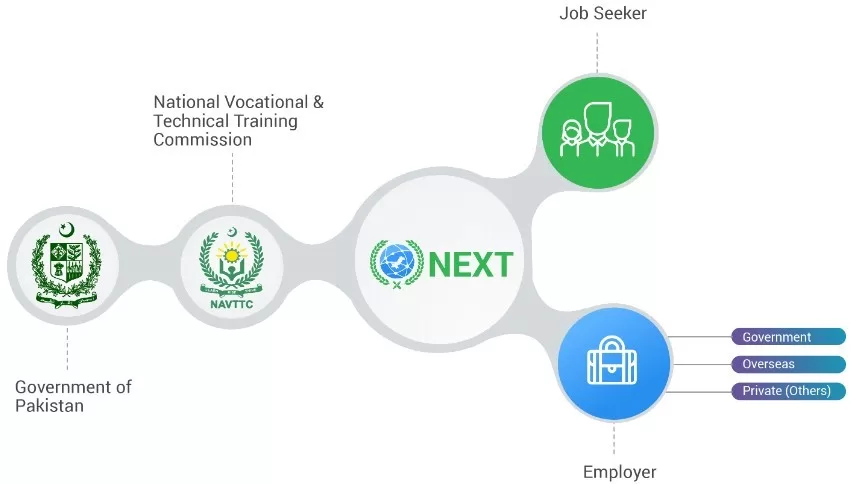
National Employment Exchange Tool (NEXT)
It is a platform established by the Federal Government under the Kamyab Jawan Program of NAVTTC. It serves as a comprehensive job portal where skilled job seekers can connect with employers across government, private, and overseas sectors. The portal enables users to filter job searches based on their skill sets and browse available job listings. Various government departments and private organizations are registered on NEXT, with the list continually expanding.
The platform benefits both job seekers and employers by facilitating free, reliable connections. Job seekers can register, create detailed resumes highlighting their skills and achievements, and share information on social media. Employers can post job vacancies, making them accessible to a broad pool of potential candidates.
Capacity Building Programs
To ensure quality and standardization in vocational and technical education, NAVTTC undertakes several certification and recognition initiatives:
Accreditation of Institutes
NAVTTC’s Accreditation of TVET Institutes program, under the PMYSDP, aims to modernize and enhance the productivity of Pakistan’s TVET institutions. Accreditation serves as a quality assurance mechanism, ensuring that these institutes meet specified standards for providing quality training. By fostering institutional reflection and evaluation, accreditation prompts a review of strengths and weaknesses, ultimately improving the standards of technical education. Through accreditation, NAVTTC aims to bring these institutes in line with international job market standards, employing it as a continuous quality control process. Accredited institutions receive clear feedback and direction for implementing necessary changes to strive for excellence. NAVTTC has accredited approximately 655 institutes, marking significant progress in ensuring quality assurance within the skill development sector of Pakistan. To be eligible for accreditation, institutes or industries must submit comprehensive project proposals, demonstrate employment opportunities for enrolled youth, provide evidence of demand analysis and past contributions to the relevant sector, and offer job placement and career counselling services. Institutes are assessed and graded based on NAVTTC’s prescribed standards and procedures, with flexibility in scoring provided for less developed areas of the country.
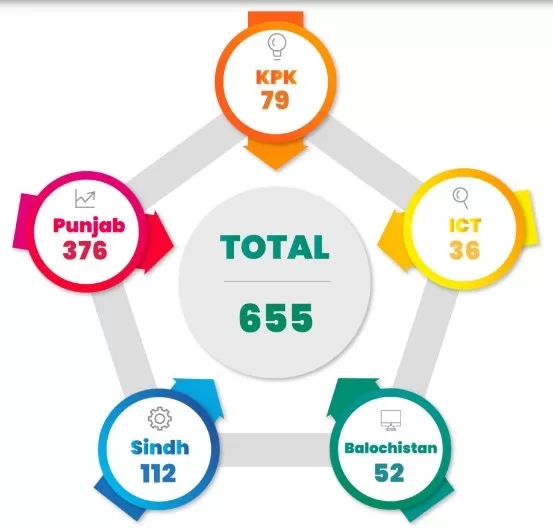
Recognition of Prior Learning (RPL)
This program aims to certify the skills of youth trained through the informal sector, particularly the ‘Ustad-Shagird’ system, to improve their employment prospects. This project recognizes and certifies skills acquired through informal or unregulated means, with over 47,000 youth already assessed and certified. Under PMYSDP, 30,156 youth have been certified. To modernize the TVET system, NAVTTC has introduced k the Competency Based Training (CBT) system, replacing traditional training methods. With support from GIZ, more than 2100 assessors have been trained and assessed on competency-based training, enhancing their standards. These assessors will play a crucial role in RPL and other NAVTTC projects. Currently, it operates 114 assessment centers nationwide for RPL activities, with plans to establish more centers across the public and private sectors. By ensuring genuinely certified workers are sent abroad, RPL aims to boost foreign remittances, positioning Pakistani skilled workers more favourably in the international market, thereby contributing to the country’s economic development.
Registration of Institutes / TTC (OEP)
This project serves as a pivotal initiative aimed at elevating the caliber and credibility of technical training centers throughout Pakistan. By overseeing the registration and regulation of institutes offering technical and vocational training, NAVTTC endeavours to bolster the standard of technical education across the nation, thereby augmenting the employability of graduates. The registration process entails various stages wherein interested institutes must furnish detailed applications to NAVTTC, delineating aspects such as facilities, curriculum, faculty, and operational frameworks. NAVTTC meticulously evaluates these applications against predetermined criteria to ascertain eligibility for registration. Once registered, institutes are mandated to adhere rigorously to NAVTTC’s guidelines and standards to uphold their registration status, necessitating compliance with regulations about program quality, facilities, faculty, student enrollment, assessment, and certification.
This project assumes a pivotal role in fostering transparency and accountability within the technical education sector by validating institutes’ commitment to meeting national standards and contributing to the nation’s skilled workforce. Furthermore, registration with NAVTTC augments the credibility of institutes in the eyes of employers, students, and stakeholders, thereby enhancing graduates’ prospects in the job market and fostering economic advancement.
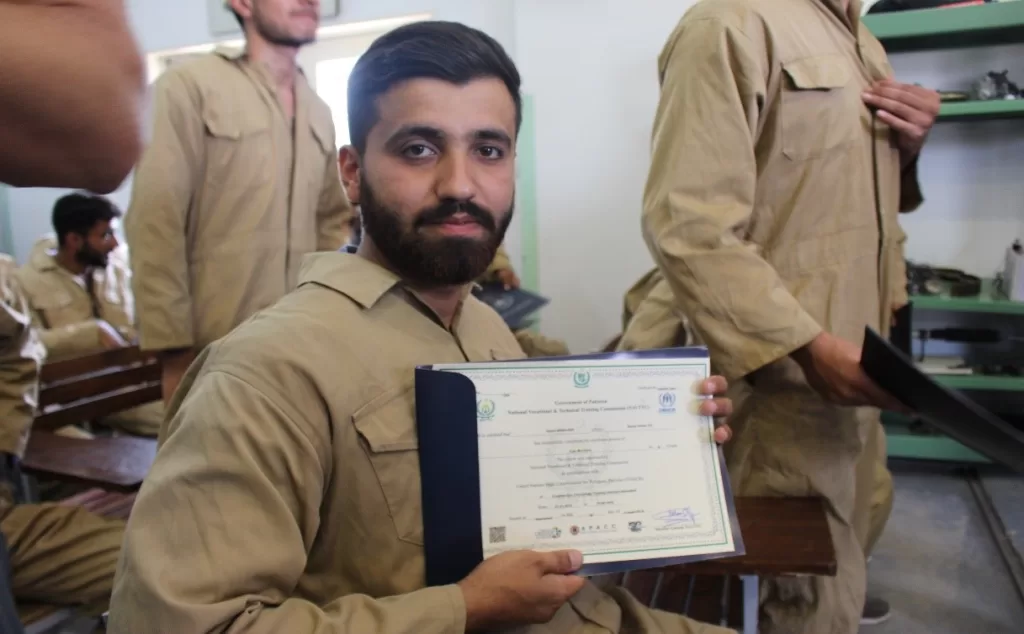
Provincial Operations
NAVTTC operates through provincial offices to ensure localized implementation of its policies and programs. These provincial bodies play a crucial role in coordinating with local TVET institutions, industry stakeholders, and government authorities to tailor initiatives to regional needs. They conduct regional skill needs assessments to identify the specific training requirements of the local workforce and ensure that training programs are relevant and effective. Furthermore, these offices monitor and evaluate local training programs and institutions to maintain high standards and continuous improvement. They also facilitate industry linkages by creating partnerships between training institutions and local businesses, thereby enhancing employment opportunities at the provincial level. Additionally, provincial offices organize training and certification programs within their regions to ensure that the workforce meets the national skill standards and is adequately prepared for the job market. This localized approach helps NAVTTC to address regional disparities and promotes inclusive development across all provinces in Pakistan.
Collaborative Efforts and International Partnerships
NAVTTC actively engages in collaborative efforts and international partnerships to enhance the quality and reach of TVET in the country. Recognizing the importance of global best practices and international standards, NAVTTC collaborates with various international development organizations, donor agencies, and foreign governments. It has formed strategic alliances with organizations such as the International Labour Organization (ILO), UNHCR, EU, and the Asian Development Bank (ADB). These partnerships have been instrumental in providing technical assistance, capacity building, and funding for various TVET initiatives in Pakistan. For example, collaboration with the ILO has helped NAVTTC to align its training programs with international labour standards, enhancing the employability of Pakistani youth in the global job market.
Moreover, NAVTTC works closely with countries known for their advanced TVET systems, such as Germany and China. These partnerships facilitate the exchange of knowledge, expertise, and technology, enabling the adaptation of successful models to Pakistan’s context. The German Corporation for International Cooperation (GIZ) provides expertise and resources to improve training standards and practices. This collaboration has been instrumental in introducing the dual training system, which combines classroom-based education with practical, on-the-job training. Similarly, NAVTTC is also collaborating with Tang Chinese International Education & Technology to focus on integrating skill education into the curriculum, improving practical training, and expanding job opportunities. These collaborations with local and multinational companies help bridge the gap between industry demand and the available skilled workforce.
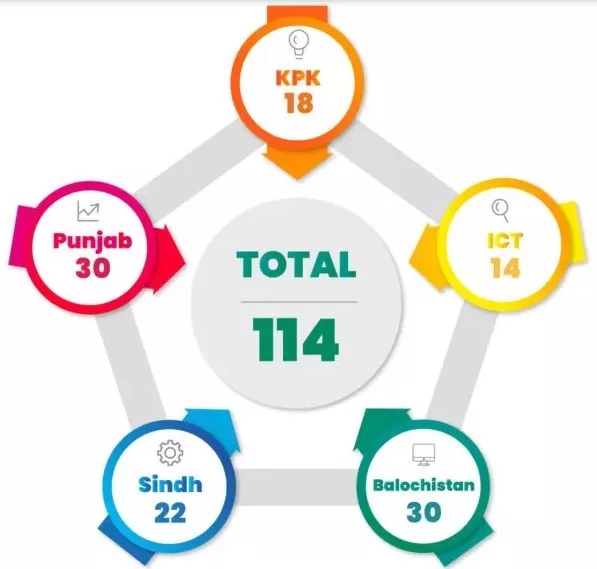
Achievements and Impact
NAVTTC has significantly advanced the TVET system in Pakistan. Key achievements include the development of the NSS, which serves as a comprehensive action plan created with input from industry experts, academia, policymakers, and international partners. It also established the NVQF to standardize qualifications, ensuring consistency and quality. The commission has improved training standards and curricula, developed a national qualifications system for teachers, and introduced accreditation systems to maintain high standards. NAVTTC’s Human Resource Development (HRD) policy focuses on creating a skilled workforce through various initiatives. They have expanded training and employment opportunities via collaborations with industry stakeholders and international partners, and have prioritized the needs of marginalized communities to ensure equitable access to TVET programs. While public-private partnerships have bridged the gap between industry needs and available skills, international collaborations with organizations have brought in technical expertise and global best practices.
Challenges and Future Directions
Despite its successes, NAVTTC faces several challenges. These include ensuring equitable access to TVET across all regions of Pakistan, keeping curricula and training methods up-to-date with rapidly changing industry needs, securing sustainable funding for ongoing and future TVET initiatives, and addressing the stigma associated with vocational training compared to traditional academic pathways. Looking ahead, NAVTTC aims to expand its training programs to cover more high-demand sectors, strengthen partnerships with industry to ensure continuous alignment with market needs, enhance the capacity of TVET institutions through infrastructure development and faculty training, and promote the value of vocational training to change public perception and increase enrollment. In essence, NAVTTC plays a crucial role in the development of a skilled workforce in Pakistan.





